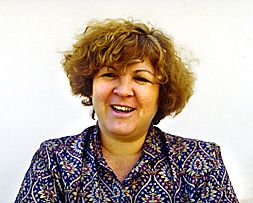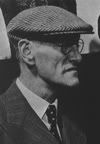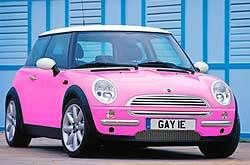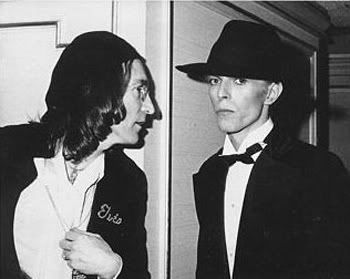|
|
Books
Oct 27, 2007 11:55:45 GMT -5
Post by Cat Stevens on Oct 27, 2007 11:55:45 GMT -5
Just spent 50 euros yesterday on some great books - there's a traditional Book Fair in Belgrade going on evey year in october, this year the special guest country is Italia, lot of Italian authors were there, unknown to me, but probably known to dino and nick - I was searching for mr. Vites books, but with no luck... ok, I was actually very lazy and wasn't searching at all for them; instead, I've spotted a daughter of Che Guevara, promoting a book of her mother's memoirs on her famous husband - it's not even out on spanish yet, only in Italian and Serbian; she's fat and disguisting -->  , not at all like her handsome father - and even worse, there was a long line of dorks of all age waiting to shake hands with the DNA of the kewl guy, and it all made me sick, so with the book in my hand I left the place for other publishers ... and here's El Comandante himself on our Book Fair in Belgrade, 1959:  ... and an off-topic pic of Che posing as young Cat Stevens:  |
|
|
|
Books
Oct 27, 2007 12:04:55 GMT -5
Post by dino on Oct 27, 2007 12:04:55 GMT -5
book... film..... gosh............ when do you think you will finally start a worthwile thread, like, CHICK or ALCOHOL or even ISLAM
anyway, only italians and serbians can be so moronic to stand in line to shake the hand of the sister of that useless twat
|
|
|
|
Books
Oct 27, 2007 12:25:02 GMT -5
Post by Cat Stevens on Oct 27, 2007 12:25:02 GMT -5
ok, so maybe I didn't have the patience to get her autograph, but at least I got a signed copy from the author of this book (# 1 in Amazon sales rank):  maybe I'll offer it on Ebay, might give me a fortune |
|
|
|
Books
Oct 27, 2007 12:25:53 GMT -5
Post by cripes on Oct 27, 2007 12:25:53 GMT -5
 Books? Fuck that shit--parading is where it's at. |
|
|
|
Books
Oct 27, 2007 12:36:04 GMT -5
Post by dino on Oct 27, 2007 12:36:04 GMT -5
so in the UK now you have your own personal plate on your car (i think is like that in the Usa from years?) like, elton john have "MU S1C" - somebody who sells cigars have of course "C1 GAR", somebody have a "GAY 8N", some smartass have "B4D 80YS”  but some things are out of law, like “W4NKA” and “W4NKR" why is that? |
|
manho
New Member
Posts: 0 
|
Books
Oct 27, 2007 12:42:08 GMT -5
Post by manho on Oct 27, 2007 12:42:08 GMT -5
'but some things are out of law, like “W4NKA” and “W4NKR"
why is that?"'
because the law is 4 4SS?
|
|
|
|
Books
Oct 27, 2007 12:52:23 GMT -5
Post by dino on Oct 27, 2007 12:52:23 GMT -5
my plate "F0CK BOB1"
|
|
manho
New Member
Posts: 0 
|
Books
Oct 27, 2007 12:58:54 GMT -5
Post by manho on Oct 27, 2007 12:58:54 GMT -5
speaking of gay, i've just read an interesting article in la repubblica online. there's a new report out on homosexuality in the animal world. they've come up with a hit parade of, "most gay animals"
1 Bison
2 Walrus
3 Monkey
4 Bird
5 Various Insects
6 Porpoise
7 Elephant
8 Giraffe
9 Hyena
10 Lion
11 Sheep
12 Cow
the moral? never turn your back on a bison.
|
|
|
|
Books
Oct 27, 2007 13:00:36 GMT -5
Post by dino on Oct 27, 2007 13:00:36 GMT -5
2 Walrus
I AM THE WALRUS! john made outing before outing was even invented!
|
|
|
|
Books
Oct 27, 2007 13:02:19 GMT -5
Post by cripes on Oct 27, 2007 13:02:19 GMT -5
2 Walrus
3 Monkey
4 Bird
All animals in titles of Lennon Beatles songs. All gay. We're talkin' top 5 gay.
|
|
|
|
Books
Oct 27, 2007 13:14:50 GMT -5
Post by cripes on Oct 27, 2007 13:14:50 GMT -5
....the cute one, the quiet one, the gay one.
Really, the more you think about it...
|
|
|
|
Books
Oct 27, 2007 14:12:20 GMT -5
Post by dino on Oct 27, 2007 14:12:20 GMT -5
i always thought yoko was really a drag queen
|
|
|
|
Books
Oct 27, 2007 14:47:39 GMT -5
Post by dino on Oct 27, 2007 14:47:39 GMT -5
and he was buddy buddy with elton john!
|
|
|
|
Books
Oct 27, 2007 15:02:53 GMT -5
Post by cripes on Oct 27, 2007 15:02:53 GMT -5
'So here's the deal--you can pretend you're Eppy and I'll be me....'  |
|
manho
New Member
Posts: 0 
|
Books
Oct 27, 2007 15:28:26 GMT -5
Post by manho on Oct 27, 2007 15:28:26 GMT -5
news just in: napoli 3 juventus 1.
dino will be loving the terroni, even if just for tonight.
|
|
|
|
Books
Oct 27, 2007 15:51:08 GMT -5
Post by dino on Oct 27, 2007 15:51:08 GMT -5
as JFK said, WE ARE ALL TERRONI!
now everybody............. o sole miooooooo
|
|
manho
New Member
Posts: 0 
|
Books
Oct 27, 2007 16:05:22 GMT -5
Post by manho on Oct 27, 2007 16:05:22 GMT -5
|
|
|
|
Books
Nov 12, 2007 17:34:29 GMT -5
Post by Cat Stevens on Nov 12, 2007 17:34:29 GMT -5
|
|
|
|
Books
Nov 12, 2007 18:11:05 GMT -5
Post by owen on Nov 12, 2007 18:11:05 GMT -5
great find fingy.
|
|
manho
New Member
Posts: 0 
|
Books
Nov 25, 2007 16:27:03 GMT -5
Post by manho on Nov 25, 2007 16:27:03 GMT -5
November 25, 2007
King of Pain
By JIM HARRISON
THE PLEASURES OF THE DAMNED
Poems, 1951-1993.
By Charles Bukowski.
Edited by John Martin.
556 pp. Ecco/HarperCollins Publishers. $29.95.
Poetry shouldn’t tell us what we already know, though of course it can revive what we think we know. A durable poet, the rarest of all birds, has a unique point of view and the gift of language to express it. The unique point of view can often come from a mental or physical deformity. Deep within us, but also on the surface, is the wounded ugly boy who has never caught an acceptable angle of himself in the mirror. A poet can have a deep sense of himself as a Quasimodo in a world without bells, or as the fine poet Czeslaw Milosz wrote:
A feast of brief hopes, a rally of the proud,
A tournament of hunchbacks, literature.
Charles Bukowski was a monstrously homely man because of a severe case of acne vulgaris when he was young. Along the way he also had bleeding ulcers, tuberculosis and cataracts; he attempted suicide; and only while suffering from leukemia in the last year of his life did he manage to quit drinking. Bukowski was a major-league tosspot, occasionally brutish but far less so than the mean-minded Hemingway, who drank himself into suicide. Both men created public masks for themselves, not a rare thing in a writer’s paper sack of baubles, but the masks were held in place for so long that they could not be taken off except in the work.
Throughout his life, Bukowski held a series of low-paying jobs so dismal that they are unbearable to list, though he did keep a position as a mail carrier for many years. Early on he was a library hound, and there are a surprising number of literary references in his work. (Quite by accident while I was writing this, the French critic Alexandre Thiltges paid a visit. He confirmed my suspicion that Bukowski had closely read Céline.) Even more surprising in this large collection are the number of poems characterized by fragility and delicacy; I’ve been reading Bukowski occasionally for 50 years and had not noted this before, which means I was most likely listening too closely to his critics. Our perceptions of Bukowski, like our perceptions of Kerouac, are muddied by the fact that many of his most ardent fans are nitwits who love him to the exclusion of any of his contemporaries. I would suggest you can appreciate Bukowski with the same brain that loves Wallace Stegner and Gary Snyder.
It is uncomfortable to realize that I have been monitoring American poetry for 50 years and am now even a member of the American Academy of Arts and Letters, which a friend refers to as “The Dead Man’s Club.” All the scaffolding around the five-story building of this poetry is actually a confusing blemish and should be ignored in favor of the building itself, but this is probably impossible until a date in the future far beyond our concern. Time constructs the true canon, not critics contemporaneous to the work, whether they are the Vendlerites of the Boston area, the Bloombadgers of New Haven or the Goodyear Tires of New York City.
Bukowski was a solo act, though his lineage is fairly obvious. You detect Whitman, Bierce, Mencken, Sherwood Anderson, Kenneth Patchen, William Carlos Williams, perhaps Villon and Genet and strongly Céline. He loved classical music, and there is an amusing poem in which he feels for Bruckner because he wasn’t a better composer. He despised Fitzgerald because to a man from the lower depths, Fitzgerald seemed sensitive only to the sufferings within the upper class. Bukowski seemed far more worried about his cats’ health than his own. One had been shot and run over but survived, though its front legs didn’t coordinate with the back, a metaphor of something, probably Bukowski’s life. He had several failed marriages — but then historically, poets are better off with imaginary lovers. He observed birds, but one cannot imagine anyone less a nature poet, if you discount the infield of a racetrack, where you could see him in the long line at the $2 window. He was deeply enthused about bars and keeping company with whores, and seemed to like the spavined landscapes of the nether regions of Los Angeles, which I myself used to visit. They are so resolutely charmless compared with the slums of New York I knew in the late ’50s, which I visited because I was advised not to.
I have wondered, when asked about Bukowski in Brazil and France, if that’s not why so many foreigners admire him: he’s simply the American of their imagination, a low-level gangster as poet. Some are Abel poets and some are Cain poets, and Bukowski is clearly the latter (there are those who think of themselves as Cain poets but shift to Abel when they get a job in academia). It is clear in reading him that Bukowski didn’t live in a gated community, whether academic or economic. His was the hard-found music of the streets.
But then, fuimus fumus — it all drifts away in smoke. It is not poetry that lasts but good poems, a critical difference. An attractive idea is that the test of poetry should be the same as Henry James’s dictum for the novel, that it be interesting. Pasternak said that despite all appearances, it takes a lot of volume to fill a life. Bukowski’s strength is in the sheer bulk of his contents, the virulent anecdotal sprawl, the melodic spleen without the fetor of the parlor or the classroom, as if he were writing while straddling a cement wall or sitting on a bar stool, the seat of which is made of thorns. He never made that disastrous poet’s act of asking permission for his irascible voice.
“The Pleasures of the Damned” is an appropriately long collection because it is likely to stand as the definitive volume of Bukowski’s poems. It is well edited by John Martin, the publisher of the estimable Black Sparrow Press, who was Bukowski’s editor for most of his working life.
It is hard to quote Bukowski because there are virtually none of those short lyrics with bow ties of closure that are so pleasant for a reviewer to quote. I will excerpt a poem evidently written quite near the end of his life:
it bothers the young most, I think:
an unviolent slow death.
still it makes any man dream;
you wish for an old sailing ship,
the white salt-crusted sail
and the sea shaking out hints of immortality
sea in the nose sea in the hair
sea in the marrow, in the eyes
and yes, there in the chest.
will we miss
the love of a woman or music or food
or the gambol of the great mad muscled
horse, kicking clods and destinies
high and away
in just one moment of the sun coming down?
I am not inclined to make elaborate claims for Bukowski, because there is no one to compare him to, plus or minus. He wrote in the language of his class as surely as Wallace Stevens wrote in the language of his own. This book offers you a fair chance to make up your own mind on this quarrelsome monster. It is ironical that those who man the gates of the canon will rarely if ever make it inside themselves. Bukowski came in a secret back door.
Jim Harrison’s most recent novel is “Returning to Earth.”
|
|